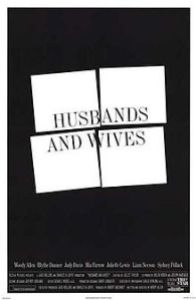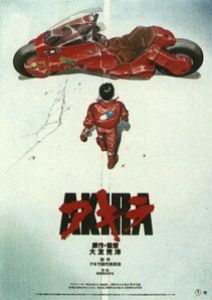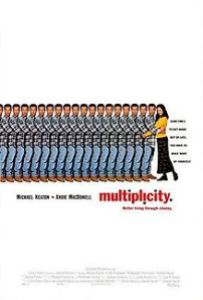Husbands and Wives (1992)
When Jack (Sydney Pollack) and Sally (Judy Davis) casually announce their marriage has ended, it forces Gabe (Woody Allen) and Judy Roth (Mia Farrow) to question their own relationship. Gabe flirts with Rain (Juliette Lewis), one of his students, while Judy eyes a relationship with Michael Gates (Liam Neeson).
Filmed as a documentary with interviews explaining the character’s inner emotions, this film asks if it’s possible to maintain vitality in a relationship, or if all long-term relationships inevitably devolve towards predictability and boredom?
While better known as the director of Tootsie (1982), Absence of Malice (1981), Out of Africa (1985), and The Firm (1993), Sydney Pollack had an extensive career as an actor with memorable roles in Eyes Wide Shut (1999), and Michael Clayton (2007). Jack, the husband in a midlife crisis, is his most realized on-camera role.
A Woody Allen regular in Alice (1990), Deconstructing Harry (1997), Celebrity (1998), and To Rome, with Love (2012), Judy Davis is a delightful actress whose lack of recognition doesn’t seem to match her talent. She’s great as Sally, the wife who thinks she wants something more than her marriage offers.
While Davis is not as well-known as her talent would suggest, Juliette Lewis is the opposite: a name we all know, and think she’s talented, but, in actuality, she peaked with Natural Born Killers (1994) when she was 22 years old. In this movie, all she has to do is be a young object of desire.
It’s hard to remember a time before Liam Neeson was a household name, but at this point in his career, his biggest role had been in Darkman (1990), and he was a year away from his breakthrough role as Oskar Schindler.
This was the last film to feature Woody Allen and Mia Farrow together. A few months after its release, Allen’s relationship with Soon-Yi Previn was made public. Watching this film now, you want to believe it offers insight into the controversy, and the faux-documentary style only adds to the impression we’re getting a glimpse into Allen’s state of mind. In light of his then burgeoning relationship with Soon-Yi, it’s a little creepy and self-indulgent Woody casts himself in a relationship with the younger Juliette Lewis.
If the movie had starred someone else it would have worked more like Woody intended and less than it does.
Akira (1988)
Tokyo was destroyed by an explosion in 1988. Neo-Tokyo, built on its ruins, is the setting for this post-apocalyptic film. Colonel Shikishima hunts for Tetsuo Shima who possesses rare psychic abilities. Eventually, Tetsuo discovers Akira someone with similar abilities, caused the explosion, was cryogenically frozen, and kept in an underground prison since.
This confusing movie feels like a special episode of Pokémon or Dragon Ball Z. It’s a decent story about the power of individuals, and you can see how it influenced the look of contemporary science fiction, but it lacks the spirit of the great animated films by Studio Ghibli.
Worth watching once, but I won’t watch it again.
Multiplicity (1996)
Contractor Doug Kinney (Michael Keaton) can’t balance his life and work. While working on a scientific facility, he meets a doctor who offers him a solution: cloning.
When one clone proves insufficient, there’s a third and even a fourth version of Doug Kinney set loose in the world. Like successive Xerox copies, each clone degrades slightly, so the last one is little more than a horrible impression of a mentally challenged adult.
Andie Macdowell plays Doug’s long-suffering wife. It would have been nice if she had a clue about what was happening with her husband. In one cringe-worthy sequence she sleeps with all three clones in succession, while her original husband is gone. She has a vague idea something is amiss, but was apparently horny enough she didn’t care.
The movie lacks the charm of Harold Ramis’ earlier work. It’s not as thoughtful as Groundhog Day (1993) or as funny as Meatballs (1979) and Caddyshack (1980).
Doug Kinney is a horrible father and husband at the beginning of the movie and by the end, he’s only slightly less horrible. He doesn’t think it’s important to tell his wife the truth, and his barely mentioned children are time-consuming obstacles instead of people he genuinely cares for.
I love Harold Ramis and I love Michael Keaton, so I wanted to love this film pairing the two together, but, just like Doug Kinney, this lazy and uninspired movie takes the easy way out.


